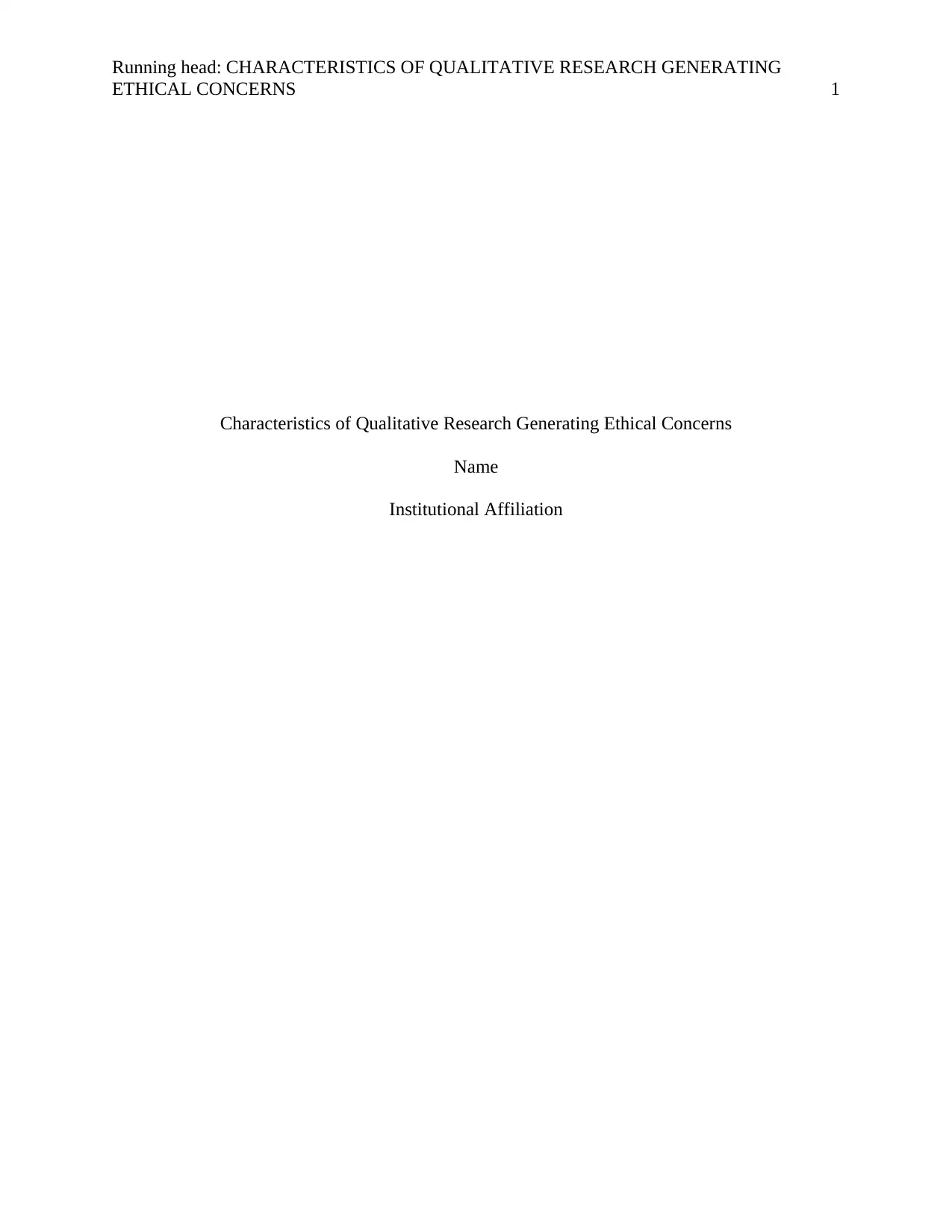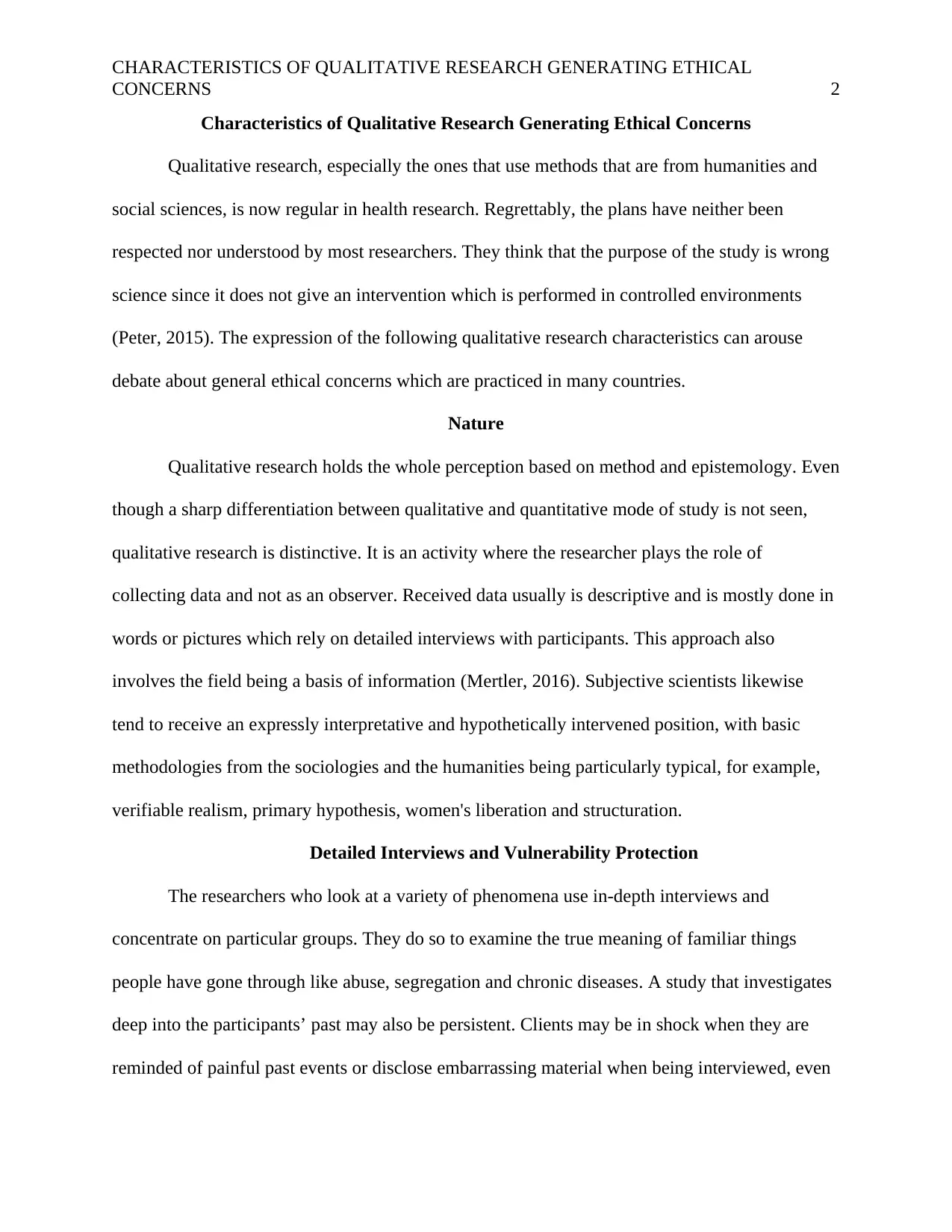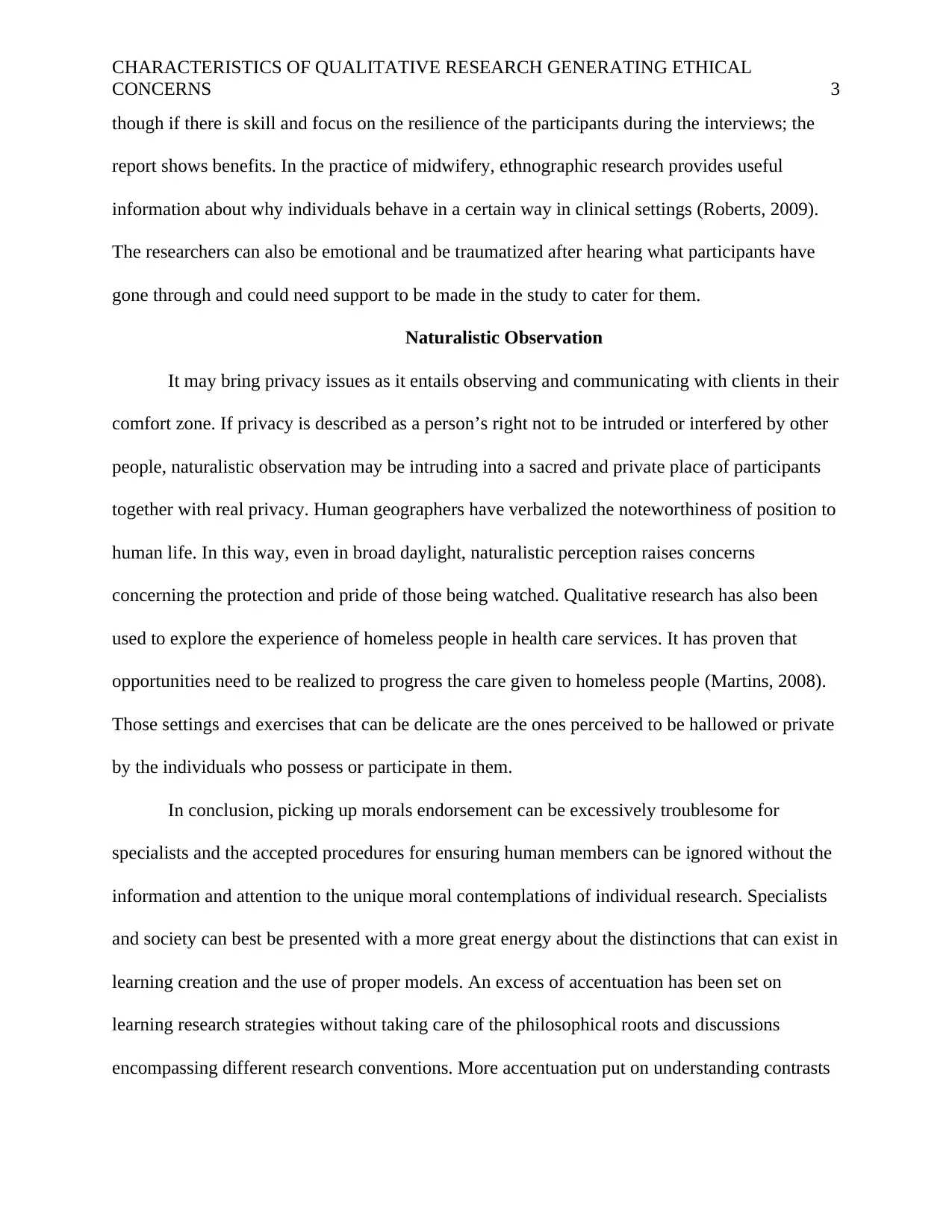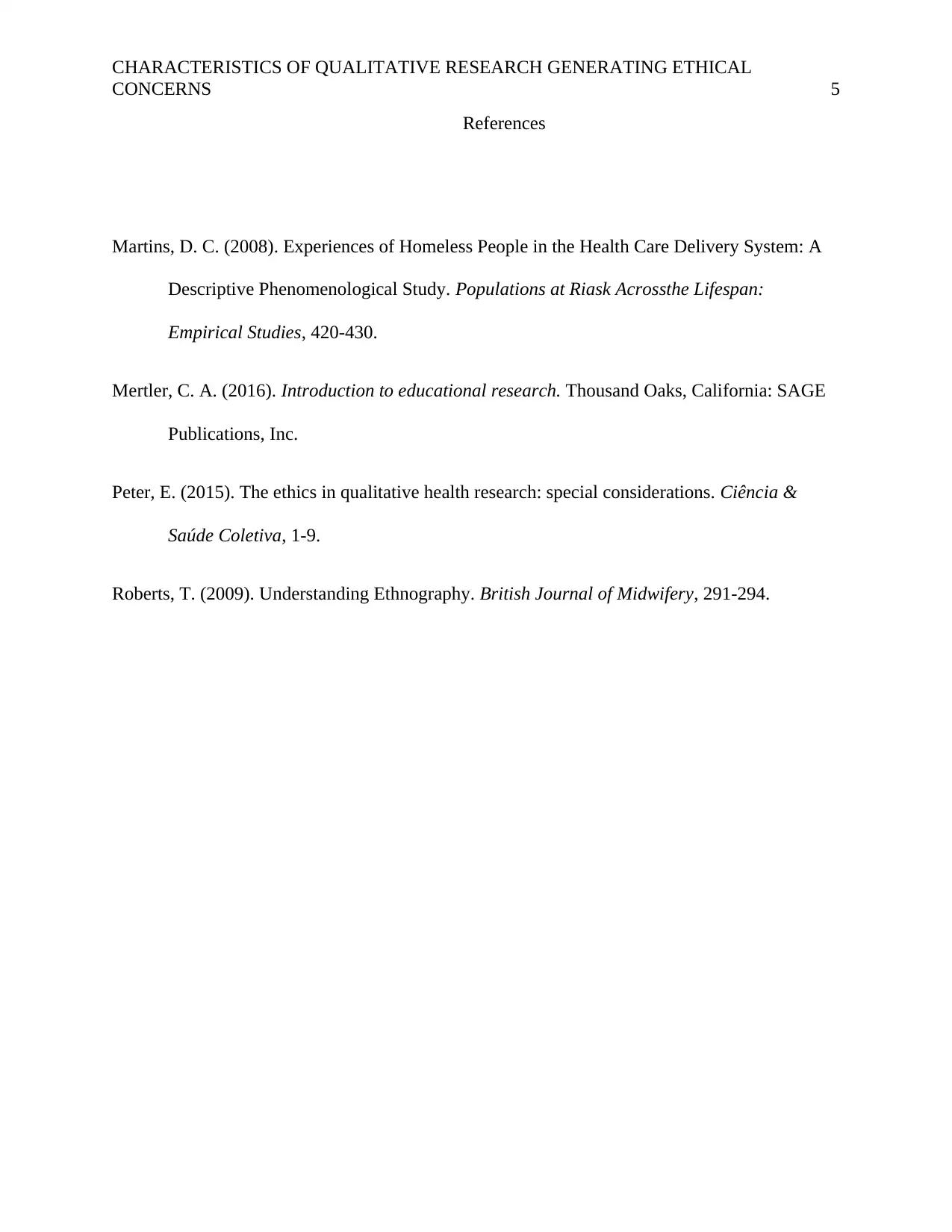Exploring Ethical Concerns in Qualitative Health Research
VerifiedAdded on 2020/04/21
|5
|819
|494
Essay
AI Summary
The essay addresses general ethical concerns arising from qualitative research characteristics. It differentiates between qualitative and quantitative approaches, highlighting how qualitative research involves active data collection by researchers through descriptive methods such as interviews and observations. Ethical debates focus on issues like participant vulnerability during in-depth interviews about sensitive topics and privacy intrusion during naturalistic observations within participants' environments. The essay stresses the need for ethical approvals tailored to individual studies, understanding philosophical roots, and respecting epistemological differences to ensure respectful treatment of research subjects. It concludes by advocating a shift from solely technique-based evaluations toward philosophically informed research practices.

Running head: CHARACTERISTICS OF QUALITATIVE RESEARCH GENERATING
ETHICAL CONCERNS 1
Characteristics of Qualitative Research Generating Ethical Concerns
Name
Institutional Affiliation
ETHICAL CONCERNS 1
Characteristics of Qualitative Research Generating Ethical Concerns
Name
Institutional Affiliation
Paraphrase This Document
Need a fresh take? Get an instant paraphrase of this document with our AI Paraphraser

CHARACTERISTICS OF QUALITATIVE RESEARCH GENERATING ETHICAL
CONCERNS 2
Characteristics of Qualitative Research Generating Ethical Concerns
Qualitative research, especially the ones that use methods that are from humanities and
social sciences, is now regular in health research. Regrettably, the plans have neither been
respected nor understood by most researchers. They think that the purpose of the study is wrong
science since it does not give an intervention which is performed in controlled environments
(Peter, 2015). The expression of the following qualitative research characteristics can arouse
debate about general ethical concerns which are practiced in many countries.
Nature
Qualitative research holds the whole perception based on method and epistemology. Even
though a sharp differentiation between qualitative and quantitative mode of study is not seen,
qualitative research is distinctive. It is an activity where the researcher plays the role of
collecting data and not as an observer. Received data usually is descriptive and is mostly done in
words or pictures which rely on detailed interviews with participants. This approach also
involves the field being a basis of information (Mertler, 2016). Subjective scientists likewise
tend to receive an expressly interpretative and hypothetically intervened position, with basic
methodologies from the sociologies and the humanities being particularly typical, for example,
verifiable realism, primary hypothesis, women's liberation and structuration.
Detailed Interviews and Vulnerability Protection
The researchers who look at a variety of phenomena use in-depth interviews and
concentrate on particular groups. They do so to examine the true meaning of familiar things
people have gone through like abuse, segregation and chronic diseases. A study that investigates
deep into the participants’ past may also be persistent. Clients may be in shock when they are
reminded of painful past events or disclose embarrassing material when being interviewed, even
CONCERNS 2
Characteristics of Qualitative Research Generating Ethical Concerns
Qualitative research, especially the ones that use methods that are from humanities and
social sciences, is now regular in health research. Regrettably, the plans have neither been
respected nor understood by most researchers. They think that the purpose of the study is wrong
science since it does not give an intervention which is performed in controlled environments
(Peter, 2015). The expression of the following qualitative research characteristics can arouse
debate about general ethical concerns which are practiced in many countries.
Nature
Qualitative research holds the whole perception based on method and epistemology. Even
though a sharp differentiation between qualitative and quantitative mode of study is not seen,
qualitative research is distinctive. It is an activity where the researcher plays the role of
collecting data and not as an observer. Received data usually is descriptive and is mostly done in
words or pictures which rely on detailed interviews with participants. This approach also
involves the field being a basis of information (Mertler, 2016). Subjective scientists likewise
tend to receive an expressly interpretative and hypothetically intervened position, with basic
methodologies from the sociologies and the humanities being particularly typical, for example,
verifiable realism, primary hypothesis, women's liberation and structuration.
Detailed Interviews and Vulnerability Protection
The researchers who look at a variety of phenomena use in-depth interviews and
concentrate on particular groups. They do so to examine the true meaning of familiar things
people have gone through like abuse, segregation and chronic diseases. A study that investigates
deep into the participants’ past may also be persistent. Clients may be in shock when they are
reminded of painful past events or disclose embarrassing material when being interviewed, even

CHARACTERISTICS OF QUALITATIVE RESEARCH GENERATING ETHICAL
CONCERNS 3
though if there is skill and focus on the resilience of the participants during the interviews; the
report shows benefits. In the practice of midwifery, ethnographic research provides useful
information about why individuals behave in a certain way in clinical settings (Roberts, 2009).
The researchers can also be emotional and be traumatized after hearing what participants have
gone through and could need support to be made in the study to cater for them.
Naturalistic Observation
It may bring privacy issues as it entails observing and communicating with clients in their
comfort zone. If privacy is described as a person’s right not to be intruded or interfered by other
people, naturalistic observation may be intruding into a sacred and private place of participants
together with real privacy. Human geographers have verbalized the noteworthiness of position to
human life. In this way, even in broad daylight, naturalistic perception raises concerns
concerning the protection and pride of those being watched. Qualitative research has also been
used to explore the experience of homeless people in health care services. It has proven that
opportunities need to be realized to progress the care given to homeless people (Martins, 2008).
Those settings and exercises that can be delicate are the ones perceived to be hallowed or private
by the individuals who possess or participate in them.
In conclusion, picking up morals endorsement can be excessively troublesome for
specialists and the accepted procedures for ensuring human members can be ignored without the
information and attention to the unique moral contemplations of individual research. Specialists
and society can best be presented with a more great energy about the distinctions that can exist in
learning creation and the use of proper models. An excess of accentuation has been set on
learning research strategies without taking care of the philosophical roots and discussions
encompassing different research conventions. More accentuation put on understanding contrasts
CONCERNS 3
though if there is skill and focus on the resilience of the participants during the interviews; the
report shows benefits. In the practice of midwifery, ethnographic research provides useful
information about why individuals behave in a certain way in clinical settings (Roberts, 2009).
The researchers can also be emotional and be traumatized after hearing what participants have
gone through and could need support to be made in the study to cater for them.
Naturalistic Observation
It may bring privacy issues as it entails observing and communicating with clients in their
comfort zone. If privacy is described as a person’s right not to be intruded or interfered by other
people, naturalistic observation may be intruding into a sacred and private place of participants
together with real privacy. Human geographers have verbalized the noteworthiness of position to
human life. In this way, even in broad daylight, naturalistic perception raises concerns
concerning the protection and pride of those being watched. Qualitative research has also been
used to explore the experience of homeless people in health care services. It has proven that
opportunities need to be realized to progress the care given to homeless people (Martins, 2008).
Those settings and exercises that can be delicate are the ones perceived to be hallowed or private
by the individuals who possess or participate in them.
In conclusion, picking up morals endorsement can be excessively troublesome for
specialists and the accepted procedures for ensuring human members can be ignored without the
information and attention to the unique moral contemplations of individual research. Specialists
and society can best be presented with a more great energy about the distinctions that can exist in
learning creation and the use of proper models. An excess of accentuation has been set on
learning research strategies without taking care of the philosophical roots and discussions
encompassing different research conventions. More accentuation put on understanding contrasts
⊘ This is a preview!⊘
Do you want full access?
Subscribe today to unlock all pages.

Trusted by 1+ million students worldwide

CHARACTERISTICS OF QUALITATIVE RESEARCH GENERATING ETHICAL
CONCERNS 4
in epistemological introductions, that is, systems rather than techniques, in the preparation of
analysts would likely build the universal regard among scientists and also help during the time
spent capable and deferential moral audit.
CONCERNS 4
in epistemological introductions, that is, systems rather than techniques, in the preparation of
analysts would likely build the universal regard among scientists and also help during the time
spent capable and deferential moral audit.
Paraphrase This Document
Need a fresh take? Get an instant paraphrase of this document with our AI Paraphraser

CHARACTERISTICS OF QUALITATIVE RESEARCH GENERATING ETHICAL
CONCERNS 5
References
Martins, D. C. (2008). Experiences of Homeless People in the Health Care Delivery System: A
Descriptive Phenomenological Study. Populations at Riask Acrossthe Lifespan:
Empirical Studies, 420-430.
Mertler, C. A. (2016). Introduction to educational research. Thousand Oaks, California: SAGE
Publications, Inc.
Peter, E. (2015). The ethics in qualitative health research: special considerations. Ciência &
Saúde Coletiva, 1-9.
Roberts, T. (2009). Understanding Ethnography. British Journal of Midwifery, 291-294.
CONCERNS 5
References
Martins, D. C. (2008). Experiences of Homeless People in the Health Care Delivery System: A
Descriptive Phenomenological Study. Populations at Riask Acrossthe Lifespan:
Empirical Studies, 420-430.
Mertler, C. A. (2016). Introduction to educational research. Thousand Oaks, California: SAGE
Publications, Inc.
Peter, E. (2015). The ethics in qualitative health research: special considerations. Ciência &
Saúde Coletiva, 1-9.
Roberts, T. (2009). Understanding Ethnography. British Journal of Midwifery, 291-294.
1 out of 5
Related Documents
Your All-in-One AI-Powered Toolkit for Academic Success.
+13062052269
info@desklib.com
Available 24*7 on WhatsApp / Email
![[object Object]](/_next/static/media/star-bottom.7253800d.svg)
Unlock your academic potential
Copyright © 2020–2026 A2Z Services. All Rights Reserved. Developed and managed by ZUCOL.





